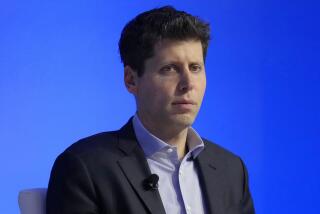Northrop’s Top Inside Auditor Gets Replaced : Reportedly Failed to Detect and Tell of Irregularities in Deals With S. Koreans
- Share via
Northrop has replaced its top internal auditor, amid what insiders describe as a failure of the corporation’s auditing apparatus to detect and report irregularities in the firm’s South Korean business deals.
The company quietly named Mitchell D. Mroz as corporate vice president internal audit earlier this month, replacing Steven Root, who had long been director of internal auditing. Root is still at the company, but without a title, a spokesman said. Root could not be reached for comment.
A Northrop spokesman said the personnel changes are unrelated to the Korean issue. He added that Root has not been demoted and is working on “special assignments.”
A federal grand jury is investigating a series of business deals that Northrop executives made with South Korean political figure and night club operator Park Chong Kyu. The company paid nearly $8 million to organizations controlled by Park in 1984 and 1985, including $6.25 million ostensibly for construction of a hotel in Seoul.
The company has said the deals were legitimate ventures to help the firm sell its F-20 jet fighter to South Korea and that Northrop was defrauded by Park. The hotel and the F-20 were both non-starters: The hotel was never built, and Northrop canceled the fighter program after failing to sell a single F-20.
The executive committee of Northrop’s board has hired a Washington law firm to conduct an internal investigation of the Korean deals, and three top Northrop executives have stepped down this year.
The internal auditing department was supposed to prevent this sort of embarrassment, and the Northrop board is said to have put “tremendous pressure” on the internal auditors to ferret out irregularities in the firm’s business with foreign agents and consultants.
At board meetings, the five-member audit committee of the board would meet in private with the company’s external and internal auditors, including Root, to remove any influence other executives might exert on the discussion of problems.
“He was given everything he wanted, and there were no limits placed on his budget,” a knowledgeable source said. “He was encouraged to really dig in. He was told that if any (foreign payoffs) occurred and he didn’t uncover them, it would be held against him personally and his job would be in jeopardy.”
A Northrop official who asked not to be identified added: “The executive committee (of the board) told Root, ‘Just keep us out of trouble.’ Now, it looks like everything has backfired on them.”
But Northrop’s chief financial officer, John B. Campbell, who is in charge of the auditing department, issued a statement Friday that the Korean business deals “never entered my mind” when he made the personnel changes involving Mroz and Root.
Northrop is facing critical questions about its Korean deals not only by the grand jury but also by a congressional committee. A former Northrop consultant has alleged that Northrop executives knew that their payments were actually intended as a lobbying fund in South Korea. In addition, some deals may have been misrepresented to Northrop’s board when it approved them.
The importance that the board placed on keeping foreign business deals clean stemmed from a Securities and Exchange Commission consent decree Northrop signed in 1975. The SEC had accused Northrop of making illegal political contributions and paying $30 million in commissions and consultant fees to foreigners without adequate controls required by securities laws.
At the same time, a permanent injunction was issued against the company that set severe restrictions on its conduct in dealing with foreign agents and consultants.
The injunction in effect requires Northrop and its chairman, Thomas V. Jones, to report “disbursements of material amounts of corporate funds to consultants, commission agents or other such persons” and to maintain adequate records on the payments.
In the current controversy, the federal grand jury is believed to be looking into whether Northrop violated the Foreign Corrupt Practices Act, which became law after the 1975 injunction.
The law forbids payments by a U.S. corporation to officials of foreign governments or political parties. In addition, a corporation can be found in criminal violation of the act if internal records of foreign agent payments are found to be inaccurate.
Root is well known within the professional auditing community in Los Angeles. He is the immediate past president of the Los Angeles chapter of the Institute of Internal Auditors and author of a textbook titled “Internal Audit Manual,” which includes detail on the Foreign Corrupt Practices Act.
“The possibility of a scapegoat here is something to watch out for,” a knowledgeable source said. “It really goes back to the executive office. If the climate is created where the auditors are expected to detect things that management is not encouraged to avoid, then you have real problems. If you set auditing up on a Keystone Cops basis, then that’s terrible.”
Mroz, the new corporate vice president internal audit, formerly was manager of internal auditing at Northrop’s B-2 stealth bomber division in Pico Rivera. “He jumped over everybody,” another source said.
Northrop apparently did not announce Root’s reassignment. One internal auditor at Northrop said that as recently as last week he thought Root was still director of internal auditing.
More to Read
Inside the business of entertainment
The Wide Shot brings you news, analysis and insights on everything from streaming wars to production — and what it all means for the future.
You may occasionally receive promotional content from the Los Angeles Times.











